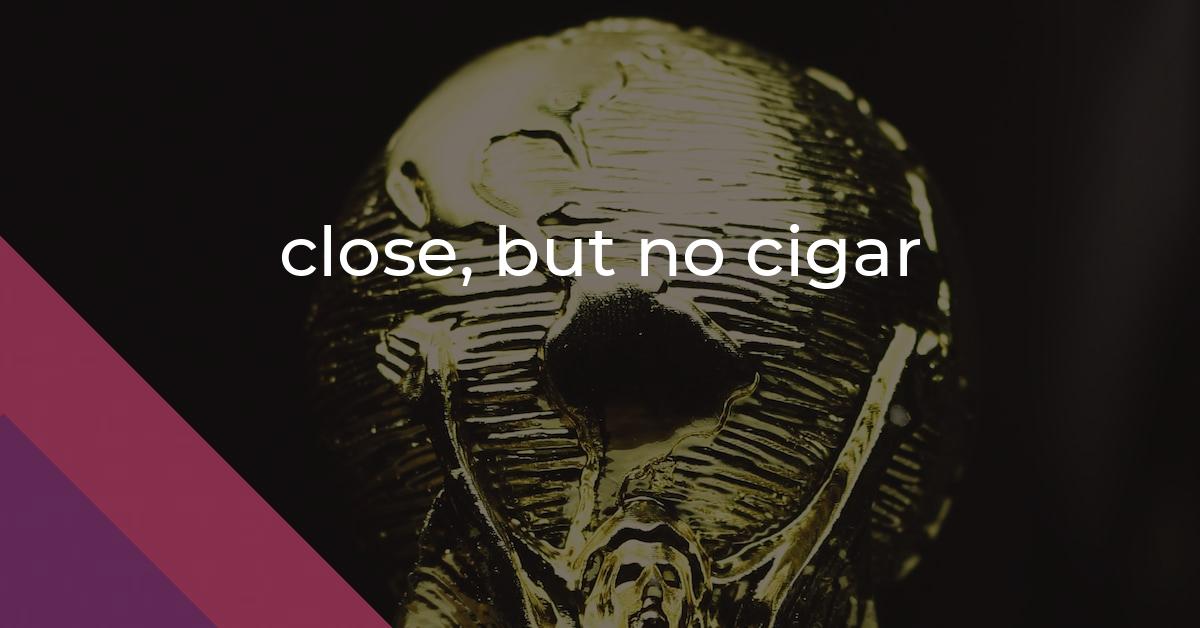close, but no cigar: Idiom Meaning and Origin
What does ‘close, but no cigar’ mean?
In the idiom "close, but no cigar", close means very near and cigar symbolizes winning or success. The saying is used to express that someone came close to achieving something but ultimately fell short or failed.

Idiom Explorer
The idiom "not quite" means to not fully reach or achieve something, indicating a slight difference or falling just short of a particular expectation or goal.
Meaning: Almost or nearly
The idiom "hit the jackpot" means to achieve a great success or obtain an unexpected, significant gain, often in a financial sense.
The idiom "hit one out of the ballpark" means to achieve outstanding success or accomplish something extremely impressive or remarkable.
The idiom "hit it big" means to achieve great success or win a large amount of money, often unexpectedly or after a long period of hard work.
The idiom "hand-in-glove" means to work closely together or have a very close and cooperative relationship with someone.
The idiom "good run" means a period of success or achievement in a particular activity or endeavor.
The idiom "good job" is used to express approval or praise for someone's work or accomplishment.
Elusive cigars
The idiom "close, but no cigar" is a familiar phrase in the English language. It is often used to convey the idea that someone has come very close to achieving something, but ultimately falls short. This phrase is related to the idiom "not quite", which carries a similar meaning of almost reaching a goal but not quite getting there.
The origins of "close, but no cigar" are rooted in the amusement industry of the late 19th and early 20th centuries. During this time period, fairgrounds and carnivals were popular sources of entertainment. One attraction at these events was various games and challenges that offered participants the opportunity to win cigars as prizes.
Participants would try their luck or skill at these games, hoping to win a coveted cigar. When someone came close to winning but fell short, the carnival workers or game operators would say "close, but no cigar" to signify their near miss. This phrase became a common way to express disappointment or acknowledge a commendable effort that fell just short of success.
The idiom "close, but no cigar" gradually gained popularity and expanded beyond the realm of fairgrounds. By the mid-20th century, it had become a commonly used idiom in everyday language. Whether in sports, academics, or other areas of life, this phrase can be used to describe a near miss or an effort that wasn't quite good enough.
The idiom "close, but no cigar" is also related to the phrase "close in on." This phrase is used to describe the act of nearing or approaching a goal or target. When someone is close in on something, they are getting closer and closer to achieving it.
Similarly, when someone is described as being "close, but no cigar," it means they were on the right track but didn't quite reach their desired outcome. It implies that they were getting closer to their goal, but fell short in the end.
An example of this could be a student who studies diligently for a test and performs well, but still falls short of getting an A. They were close in on an A, but ultimately didn't achieve it.
The idiom "close, but no cigar" can also be connected to the phrase "come to a close." When something comes to a close, it means it is nearing its end or reaching its conclusion.
Using this connection, "close, but no cigar" can be used to describe a situation where something is near its conclusion, but doesn't quite reach it. It suggests that the ending was close at hand, but there was a missing piece or a final step that prevented it from being fully realized.
An example of this could be a race where a runner is in the lead for most of the race but stumbles right before the finish line, allowing another runner to overtake them. They were close, but no cigar in terms of winning the race. Their nearness to the finish line made their loss all the more disappointing.
The idiom "close, but no cigar" is a widely recognized phrase that conveys the idea of coming close to achieving something but ultimately falling short. It originated from the amusement industry and has since become a commonly used idiom in everyday language. It is related to the idioms "not quite", "close in on", and "come to a close", which all carry similar meanings of near misses or efforts that didn't quite reach their desired outcome.
Example usage
Examples of how the idiom *close, but no cigar* can be used in a sentence:
- You nearly solved the puzzle, but close, but no cigar.
- The runner finished in second place, close, but no cigar.
- She missed the promotion by a small margin, close, but no cigar.
More "Phrase" idioms



